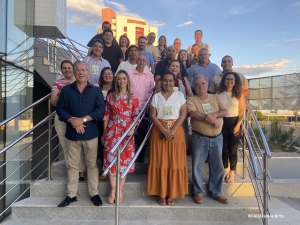Brazil, the Dominican Republic, and countries in Central America exchanged techniques and best practices to overcome challenges related to water scarcity in agriculture
Representatives from six countries visited Brazil for technical conferences and field visits on water management and climate risk zoning.

Brasilia, Brazil, April 3, 2024 - It is estimated that around 10.5 million people live in the Central American Dry Corridor, with approximately 50% of this population living in poverty. In order to exchange experiences on new monitoring and water resource management technologies, as well as to learn about the functioning of the Brazilian Climate Risk Agricultural Zoning (ZARC) system, six countries from the Central American Integration System (El Salvador, Honduras, Guatemala, Panama, the Dominican Republic, and Costa Rica) participated in an international mission in Brazil from March 18 to 23. The activity included a series of technical conferences and field visits to the region with the greatest water scarcity in the country: the Semiarid, which is home to around 28 million inhabitants.
This exchange was a joint action between the Brazilian Cooperation Agency of the Ministry of Foreign Affairs (ABC/MRE) and the Food and Agriculture Organization of the United Nations (FAO), under the project "Innovation for the Reduction of Agro-Environmental Risks in the Countries of the Central American Dry Corridor: Agricultural Zoning for Climate Risks (ZARC) and Water Resources Management." This initiative aims to contribute to mitigating the effects of droughts in the areas of family agriculture and rural development in three countries: Guatemala, El Salvador, and Honduras.
Carolina Salles, project analyst at ABC/MRE, explained that the countries had the opportunity to learn from Brazilian family farmers' experiences using water management techniques and preserving the Caatinga biome (recaatingamento). These practices enable their families' sustenance and prevention against climatic variations through water use for animal husbandry, as well as the cultivation of food for consumption and commercialization. "It was very important for the delegation countries to have contact with these experiences, as they will enrich the development of our work plan, which will be our next activity," she commented. The actions in this plan aim to meet the demands of the three countries participating in the project - El Salvador, Honduras, and Guatemala - to improve the food security of family farmers.
Ronaldo Ferraz, coordinator of the Initiative for Latin America and the Caribbean Without Hunger 2025 project, highlighted the importance of the Climate Risk Agricultural Zoning (ZARC) tool as a public policy benefiting family agriculture through the anticipation of climatic effects.
According to Julian Carrazon, Agriculture Officer at the FAO Office for Mesoamerica, many of the challenges faced by Brazil and the countries of the Central American Dry Corridor are similar in terms of addressing the needs of families and agricultural production. For Carrazon, the mission confirmed that the ZARC project is highly relevant for the Dry Corridor region. "I believe we need to go further in the development of the tool to respond more effectively to the needs," he noted. He also emphasized that solutions such as providing water for human consumption or agricultural use should be developed within a highly participatory framework, "involving the opinion and validation of the communities involved," he stressed regarding the importance of exchange and collaboration for knowledge and technology generation.
Brazilian Experiences
The international delegation participated in a series of technical conferences and experience exchanges presented by researchers from the Brazilian Agricultural Research Corporation (Embrapa), including the Embrapa Soil, Embrapa Semiarid, and Embrapa Digital Agriculture units, as well as representatives from the Brazilian Semiarid Articulation (ASA), the Pernambuco Water and Climate Agency (APAC), the Northeast Bank, the Regional Institute of Appropriate Small Agriculture (IRPAA), and the Araripe Foundation. Topics discussed included agroecological zoning for sustainable soil and water management and use, water resources management, water capture and storage technology for the Semiarid, Brazilian agricultural climate insurance, among others. Additionally, the experience of the REDESER project, implemented by FAO in Brazil to combat desertification in the Brazilian Semiarid, was presented.
During the two days of field visits, the group learned about various good practices implemented in the region for coping with drought. One of these highlighted experiences was the Coopercuc cooperative, located in Uauá, Bahia, where successful initiatives for sustainable use of agro-systems were presented, as well as opportunities for marketing and family agribusiness, such as dairy production.
Additionally, initiatives in environmental preservation areas aiming to reverse the desertification of the Caatinga biome, an exclusive biome of Brazil, through sustainable use of natural resources, were visited.
Allan Caravantes, representative of the Ministry of Agriculture of Guatemala, emphasized the relevance of addressing water resource management due to the challenges facing his country, mainly related to climate variability and irregular rainfall patterns. During rainy periods, the absence of precipitation for many days is observed, despite meteorological forecasts. According to Caravantes, this rainfall shortage is reflected in records reaching a maximum of 150 millimeters, an insufficient amount to meet agricultural needs. "That is why it is important to provide alternatives to farmers in terms of rainwater harvesting so that they have water for the critical crop season. Additionally, our subsistence farmers use the rainfall cycle to produce. The main crop is maize, the basis of the country's food security," he emphasized.
The Project
The project "Innovation for the Reduction of Agro-Environmental Risks in the Countries of the Central American Dry Corridor: Agricultural Zoning for Climate Risks (ZARC) and Water Resources Management" is part of the activities of the Initiative for Latin America and the Caribbean Without Hunger 2025 project, under the Brazil-FAO International Cooperation Program. The objective is to improve institutional capacities for decision-making related to productive systems in the Dry Corridor and arid areas of the SICA region, to increase resilience and adaptation to climate change in these countries.
